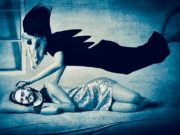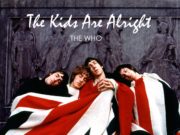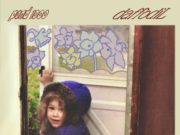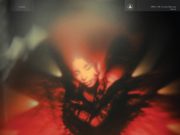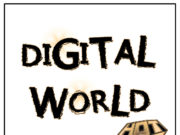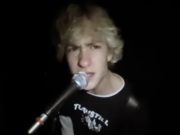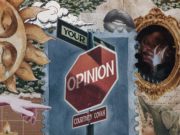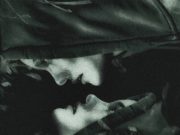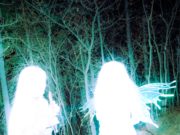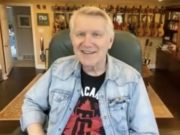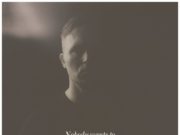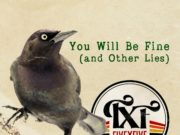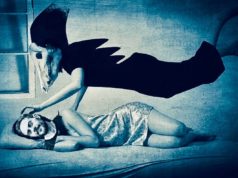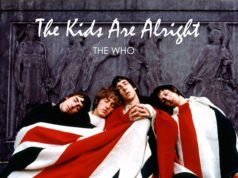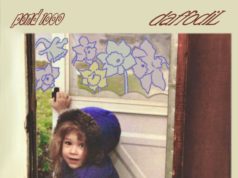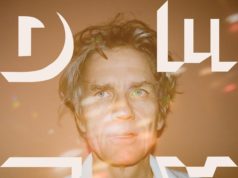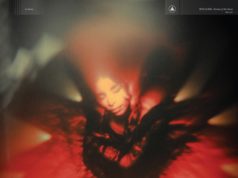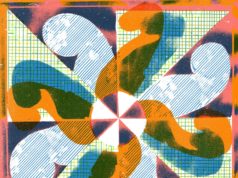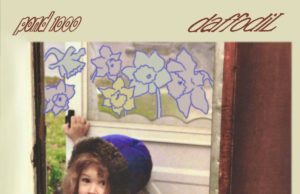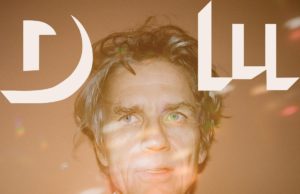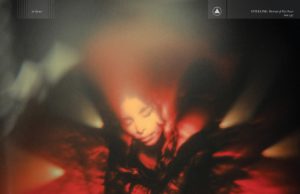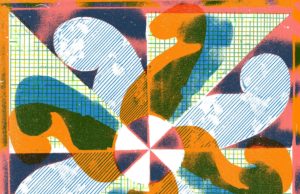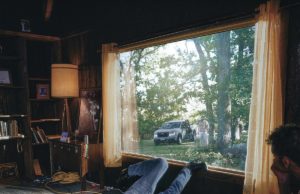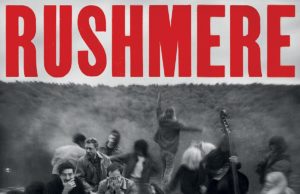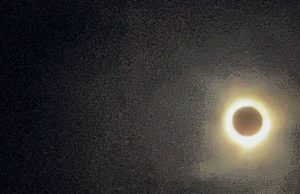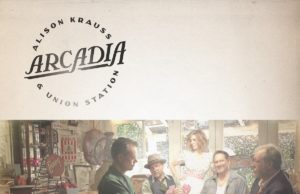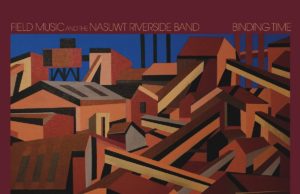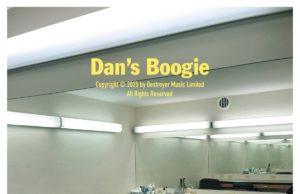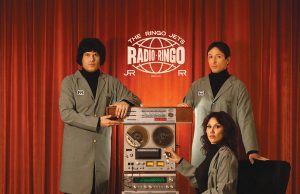THE EDITED PRESS RELEASE: “Within the first few moments of their self-titled album, Honey Harper & The Infinite Sky deliver a dashed-off statement on the trappings of country music and their desire for transcendence: “I’m sick and tired of three chords and the truth / I think I’m ready for some computer blues.” In keeping with the album’s kaleidoscopic references — The Bee Gees, Frank Ocean, Greek mythology, sci-fi futurism — that lyric evolved in part from an in-studio discussion of French philosopher Jean Baudrillard and his theory of simulation.
“Baudrillard talks about how the world we live in is so far removed from the original source, it’s impossible to distinguish between what’s authentic and inauthentic,” explains frontman William Fussell. “But with country music, every former generation questions the authenticity of the new guard: In the ’60s all the players from the ’50s said, ‘That’s not real country music,’ and that way of thinking has kept repeating itself to this day. With this record we wanted to question and play with the idea of authenticity, to push against the limits of country and hopefully create something that’s never been done before.”
The followup to their 2020 full-length debut Starmaker — a critically lauded album that earned comparisons to both Gram Parsons and Brian Eno — Honey Harper & The Infinite Sky emerged from a deliberate revamping of the band’s creative approach. In perhaps the most significant shift, Honey Harper co-founder and keyboardist Alana Pagnutti took on a far greater role in the songwriting process, tapping into her eclectic art-world background and adding a palpable new depth to their lyrical output. Produced by Fussell and Pagnutti and mixed by Joel Ford, the album also marks Honey Harper’s first time recording with The Infinite Sky, a stacked backing band featuring their longtime bassist and contributing writer Mick Mayer, pianist John Carroll Kirby (Solange, Steve Lacy), Spoon keyboardist Alex Fischel, guitarist Jackson MacIntosh (Drugdealer, Jessica Pratt), pedal-steel player Connor Gallaher (Black Lips, Calexico), and TOPS drummer Riley Fleck.
And in a drastic departure from Starmaker — a rigorously experimental album that found Fussell and Pagnutti traveling the world to work with the likes of the Hungarian Studio Orchestra and Parisian polymath Sébastien Tellier — Honey Harper & The Infinite Sky’s time-bending brand of Americana took shape in a series of freewheeling sessions at Tropico Beauty Studios in L.A. “Instead of taking two years, we took two weeks and cut everything to tape,” says Fussell. “We did every song in three takes and then picked the best one; the idea was to take advantage of the spontaneity that makes Americana unique, and create without any pressure and with almost no rules.”
Informed by a vast range of influences (everyone from George Jones to David Bowie to Kanye West), Honey Harper & The Infinite Sky mines decades of musical history and places the most time-worn touchstones in unexpected new contexts (including, for example, a Townes Van Zandt-inspired love song whose narrative hinges on a multiverse-style splitting of timelines). A postmodernist pastiche, the album represents a seamless merging of Fussell and Pagnutti’s distinct artistic paths.
Fussell was born in a small Georgia town and spent his early childhood in Florida, the son of an Elvis impersonator who turned him onto to classic country artists like Waylon Jennings as a kid. After returning to Georgia at age 10, he spent his adolescence playing in punk bands and singing in church choirs, and later co-founded an Atlanta post-punk act called Mood Rings. While touring in 2013, Fussell met and fell in love with Pagnutti, a Toronto native who was then living in New York City and working at an art gallery.
“I’d just finished my master’s in contemporary art and was working on a book about the radio works of Robert Rauschenberg and John Cage — I’ve always had one foot in art and one foot in music,” says Pagnutti, who played banjo and cello as a child. When Pagnutti moved to London in 2015 to work for the Whitechapel Gallery, Fussell joined her and soon began crafting the songs that would lead to Honey Harper’s 2017 debut EP, Universal Country. “I was working on other projects at the time and Alana really encouraged me to record that EP,” Fussell says of his now-wife. “Even though it started off as a solo thing Alana’s always had a hand in it, and now she’s a major part of the songwriting. It’s completely changed the whole situation, mainly because of how she’s able to bring so much meaning to the songs.”

Despite the high level of conceptualization that went into its creation, Honey Harper & The Infinite Sky embodies an irresistibly loose and groove-heavy sound that hits with an immediate impact. “With Starmaker the tagline was ‘Country music for people who don’t like country music,’ but this album feels more like country music for everyone,” Pagnutti notes. On the Baudrillard-referencing Ain’t No Cowboys in Georgia, for instance, Honey Harper contrast the track’s spirit of weary frustration with luminous piano melodies, swooning lap-steel tones, and glorious guitar solos from MacIntosh and Gallaher. (Directed by their repeat collaborator Angus Borsos, the video for Ain’t No Cowboys in Georgia expands on the album’s delicate twisting of genre tropes, presenting what Fussell pitches as “Blade Runner but with cowboys.”)
Written and recorded in just 30 minutes, Broken Token takes a cue from The Allman Brothers Band’s bluesy breed of Southern Rock, unfolding in soulful harmonies and free-flowing rhythms. Meanwhile, on Boots Mine Gold, Honey Harper offer up a wildly euphoric dancefloor anthem built on jangly guitar riffs, glitzy synth tones, and a few loving lyrical nods to Gloria Gaynor and Saturday Night Fever. “It’s a simple breakup song, a dance-your-heartache-away kind of thing, but through the guise of a disco-country track,” says Fussell.
Although much of Honey Harper & The Infinite Sky bears a mood of bittersweet longing, the album’s raw emotion gets intensified on tracks like Tired Of Feeling Good. With its graceful interlacing of lush piano and sleepy pedal steel, the song gently spikes their heavy-hearted introspection with a bit of bristling humor (from the chorus: “If you’re tired of feeling good all the time / Just hang around with me for a while”). “It felt right to add a little sarcasm there, kind of like laughing to break through the sadness,” says Pagnutti, while Fussell refers to Tired of Feeling Good as “our tongue-in-cheek Dr. Hook song.”
And on the impossibly catchy Hard To Make A Living, Pagnutti demonstrates her immense imagination as a lyricist, imbuing some pure country poetry into the track’s mythologically inspired storytelling (e.g., “My beauty glows in the cold rhinestones”). “We wrote that song in somewhat of a pandemic-related depressive state, reevaluating what we wanted to do and whether it was right for us,” says Pagnutti. “We’d spent so long working on Starmaker and then it came out right before the pandemic, which left us feeling really discouraged. I wanted to investigate the idea that if you haven’t made it by a certain age, then you’re not going to make it at all, and I ended up writing about the Greek myths of Daphnis, Narcissus and Hyacinth: All young, beautiful boys whose lives were taken away from them before they really had a chance to live.”
While Honey Harper & The Infinite Sky returns to many of the themes embedded in Starmaker, the album ultimately reveals entirely new dimensions of their shapeshifting musicality. “With Starmaker we meticulously worked through every single detail on the record, trying to create a sound that challenges the idea of what country music can be,” says Fussell. “It was about sonically pushing the limits, whereas this time there’s more of a philosophical bent to the lyrics. But even though there’s maybe more substance to dive into on the new record, it ended up being way more fun to make. If we didn’t want to keep on exploring different avenues in terms of how we make records, we’d pretty much do the exact same thing all over again. It’s magical to see what can be done when you’re working so spontaneously with such an amazing band.”
As they look toward future projects, Honey Harper see endless possibilities for defying the confines of country traditionalism. “Maybe we’ll make something we might call computer country, where we’re writing songs with AI and recording only with digital instruments — just completely eradicating any semblance of authenticity,” says Fussell. Not only a reflection of their restless creativity, that thirst for reinvention echoes a Bowie-esque affinity for playing with identity (an element that extends all the way to their moniker, formed by combining the names of Fussell’s two grandmothers to dream up the character of Honey Harper).
“We’re really inspired by the thought of constantly trying on different personas and changing the context for the music we make,” says Fussell. “Whether that means recording a country album only with synthesizers, or creating the persona of a pop-country singer, or something else we haven’t even imagined yet, we just want to keep pushing into different directions and leave people wondering where we’re gonna go next.”


